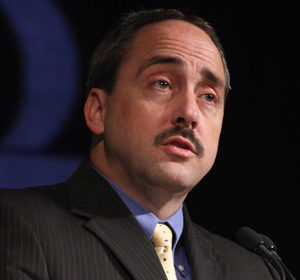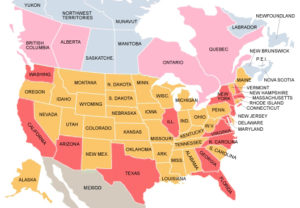Larry Dominique, CEO of PSA Group North America, told reporters after an Automotive Press Association meeting in Detroit, that he has narrowed 15 states and 4 Canadian provinces as top picks and possible points of entry for sales as PSA Group continues to ramp up plans to return to North America.
 Larry Dominique, CEO of PSA Group North America
Larry Dominique, CEO of PSA Group North America
Dominique said he is focusing on 15 states with customers who are willing to buy imports and represent 62 percent of vehicle sales. States mentioned include: California, Texas, Florida, New York, Illinois, New Hampshire, New Jersey, Arizona, Washington, Massachusetts, Virginia, North Carolina, Georgia and Maryland. The 15th state was undisclosed. We find it rather odd that Michigan, Kentucky Vermont, Connecticut, and Rhode Island were not mentioned.
“Those states are of the most interest to me at this point in time because they’re high volume and import receptive,” said Dominique. “In Canada, PSA also is looking at four provinces (British Columbia, Alberta, Ontario and Quebec) that represent 87 percent of Canadian sales.”
 Proposed states (in red) and Canadian provinces (in pink) for PSA car sales.
Proposed states (in red) and Canadian provinces (in pink) for PSA car sales.
Of course, the big question, unanswered at this time is; What cars will be offered? The timeframe has previously been stated by PSA Group International CEO Carlos Tavares that the company hopes to sell cars again in North America by 2026.
PSA Group has a three-pronged, 10-year plan to sell cars again in North America. Its first play is through mobility. It launched the Free2Move app in Seattle in fall 2017. The app lets customers order and pay for a variety of transportation services, such as ride-hailing or public transit, with one mobile app.
Free2Move also is the brand PSA Group will use to launch a new car-sharing service in the U.S. An announcement is expected within weeks on the non-PSA vehicle brand it will use, said Dominique. PSA will use a leasing partner for about 600 vehicles, though PSA and the automotive brand had to come to an agreement.
As for how PSA will sell cars in the U.S., Dominique has been looking at innovative distribution models for its vehicles outside of the traditional franchise system. He is also considering a dealer network and has been meeting with dealers to explore retail models.
And while the company’s focus is on new cars, PSA also is looking at what it will do with cars that will come out of service from car-sharing. In Europe, for example, PSA has Free2Move used car sales. “How do I re-market those vehicles in a way that I can protect the residual value and so forth,” he said. “That’s really important to us.”
President Donald Trump’s proposed Tariffs could affect the US return. Dominique admitted that the 25 per cent surcharge could force a re-think in PSA North American plans, “Tariffs are on our minds. Tariffs impact how fast and at what price point we import vehicles into the U.S. I’m crossing my fingers,” he said.
According to Dominique, PSA has already started engineering its future models to comply with safety and emissions standards in the United States. It is possible that PSA will only be able to justify selling high-priced models in the United States if tariffs become a reality.
Whatever happens, Dominique says that PSA remains confident in its chances of proving successful in Canada. Not only does part of the country speak French but a free-trade deal was secured between Canada and the European Union last year. “We think we’ll have success in Quebec,” Dominique said.


